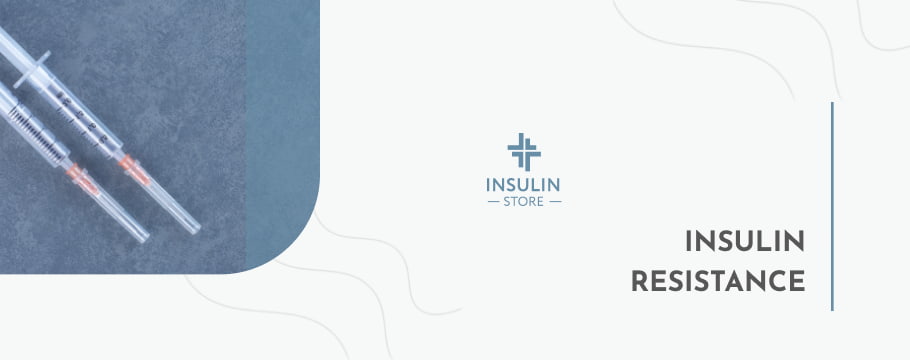
What Is Insulin Resistance? Symptoms and Causes
Insulin – an extremely important hormone that is produced naturally by the pancreas (a gland placed behind the stomach) in the human body. Normally, this hormone is responsible for controlling blood sugar levels and transferring blood glucose from the bloodstream to such tissues as the liver, fat, and muscles, and converting it into energy for our body afterward.
However, sometimes tissues resist the action of natural insulin, so the pancreas works harder to produce more insulin and keep blood glucose levels within a normal range. But if the pancreas is not able to produce enough insulin, glucose in the bloodstream may cause various health conditions in patients, such as type 1 and type 2 diabetes, increased cholesterol level, high blood pressure, obesity, etc. That is why mostly the treatment is inevitable.
So, let’s talk about this theme a little more. What is and what causes insulin resistance? How to reverse it? What are the most common symptoms? Keep reading to learn more on this topic.
What is insulin resistance?

Even though sometimes the pancreas is able to work harder and produce enough insulin, in most cases, its ability to produce the hormone decreases, and insulin resistance prediabetes, which can potentially grow into type 2 diabetes mellitus, appears. Thankfully, with the help of a doctor, it is possible to pick correct insulin medications to support the patient and do not let health problems prevent them from living a full, happy life.
If not treated on time, insulin resistance may lead to such dangerous health issues as kidney disease, stroke, heart attack, cancer, various eye problems, and Alzheimer’s disease. That is why it is essential to always check on your health and has regular appointments with your health care provider.
What causes resistance to insulin in people?

This issue may also appear in people with normal weight because of the following reasons:
- Increased fructose consumption from sweet foods (not fruit);
- Inflammation in the body and high oxidative stress;
- Passive lifestyle. Various types of activities increase insulin sensitivity in person when the lack of them works vice versa;
- Disruption in the bacterial environment in the gut, which sometimes causes inflammations.
Besides the factors mentioned above, insulin in people may occur due to the high level of stress in everyday life, different genetic reasons, as well as social situations.
People categories inclined to insulin resistance
According to the American Diabetes Association, there are some categories of patients that are more likely to develop insulin resistance over time. Here are some of the risk factors:
- Excessive weight or obesity, especially the type where the fat is concentrated mainly around the midriff;
- People with a passive lifestyle and sit-on job, lack of activity and exercises;
- Bad habits, such as smoking, alcoholism, etc.;
- Mental health issues that may cause lack of sleep, constant nervousness, and stressful lifestyle;
- Fatty liver disease;
- Polycystic ovary syndrome;
- High blood pressure;
- A family history of type 2 diabetes mellitus.
Please note that all of the factors may lead not only to insulin resistance but also to prediabetes and type 2 diabetes (if beta cells in the pancreas can’t make enough insulin on their own). It can also mean that the person tends to develop heart diseases, as well as other cardiovascular and cerebrovascular health conditions (e.g., stroke).
As you can see, some of the factors can be avoided if the person switches to a healthier lifestyle. Not only that, but health authorities are also focusing more on lifestyle measures that can assist in reducing the danger of this disease.
What are the symptoms of insulin resistance?
It is not really possible to find out whether you insulin resistant just from the way you feel. In order to know for sure, the person needs to get blood tests (plasma glucose test, glucose tolerance test, A1c test, etc.). In this way, blood sugar levels may be measured. These types of “tracking technologies” can also show whether you have the conditions of insulin resistance syndrome (high blood pressure, low “good” cholesterol levels, and high triglycerides). But it is impossible to know it without seeing the doctor.
People should be aware of the following warning signs insulin resistance causes as well:
- Blood pressure readings of 130/80 or higher;
- A waistline of more than 40 inches in men and 35 inches in women;
- A fasting glucose level more than 100 mg/dL;
- A fasting triglyceride level higher than 150 mg/dL;
- An HDL cholesterol level less than 40 mg/dL in males and 50 mg/dL in females;
- Skin tags;
- Acanthosis nigricans skin condition (areas with dark, velvety skin).
As you can see, high blood sugar levels and hormone insulin levels are the key factors that may prove your health issues. But, except that such signs as excessive body fat, increased blood pressure, etc., are also something you should be aware of. A doctor’s help is always required, so take care of yourself and undergo a regular medical examination.
How to reverse insulin resistance?

- Start exercising. In this way, it is possible to improve insulin sensitivity in the body and see positive changes and weight loss almost right away;
- Eliminate belly fat. As it is one of the factors that have the most influence on insulin resistance development, this goal should be a priority. Regular exercising, healthy diet and special vitamins are very important for that;
- Get rid of bad habits (especially smoking). Nicotine, as well as alcohol, may make insulin resistance symptoms worse;
- Reduce sugar consumption. Quick sugary snacks and sweet beverages are not very good even for those without insulin resistance. This advice does not include natural sugar (fructose) from fruits;
- Follow a healthy diet and eating regime. Do not skip meals, add nuts and fatty fish to your ration, and count your calories. It is also a good idea to try intermittent fasting. You may get some help from a professional nutritionist;
- Include omega-3 fatty acids in your diet. It can lower blood triglycerides make insulin resistance easier on you;
- Work on your sleep schedule. Poor sleep may affect insulin absorption by the tissues, so improving sleep quality is vital. Sleeping pills, aromatherapy, and a stable sleeping schedule would be very helpful in this case;
- Avoid stressful situations. Meditation or learning to control your emotions may be very helpful.
- Consult with a specialist and take medications they prescribe to you. There are a lot of remedies that are beneficial in controlling blood sugar on a normal level.
Is there any difference between insulin resistance, prediabetes, and type 1 diabetes, and type 2 diabetes?
According to the record, it is medically reviewed that every third person in the United States suffers from at least one of the diseases mentioned here. Even though insulin resistance, prediabetes, and both types of diabetes are connected with insulin levels in the blood, they have some differences that distinguish them from one another. Let’s discuss in more details:
- Insulin resistance. Due to this health issue, the body does not respond to insulin naturally produced by the pancreas, so it starts to work harder and let insulin out in even larger amounts. It leads to high blood glucose levels and various other complications;
- Prediabetes. This problem usually occurs in people with insulin resistance or in those whose pancreas is unable to produce enough insulin for controlling blood sugar levels; thus, if glucose stays in the bloodstream and not entering the cells, a high risk of type 2 diabetes development appears;
- Type 1 diabetes. This issue appears when the pancreas is not able to produce insulin naturally. It rarely depends on such factors as lifestyle, diet, and exercise routine and can often be inherited. For people with this disease, it is important to constantly monitor their blood sugar and take their medication on time;
- Type 2 diabetes. This type is the most common and represents nearly 85% of diabetes cases in America. Because of this disease, insulin cannot be absorbed by the body tissues fully, so the blood sugar level is higher than average and can cause many health complications. Special medications prescribed by the doctor help to rearrange glucose from the bloodstream to the body tissues and avoid dangerous consequences.
The bottom line
Insulin resistance is a very dangerous and tricky disease that may lead to various health complications. However, this diagnosis is not a verdict; it is possible to work on your health, improve overall health condition and reduce all unpleasant consequences and symptoms to a minimum. Losing body fat, starting a healthy diet and sport routine, cutting off bad habits may make this disease much easier on the person. Everything is possible if you take care of the symptoms on time and regularly consult with a medical specialist. Thanks for reading, and stay safe!